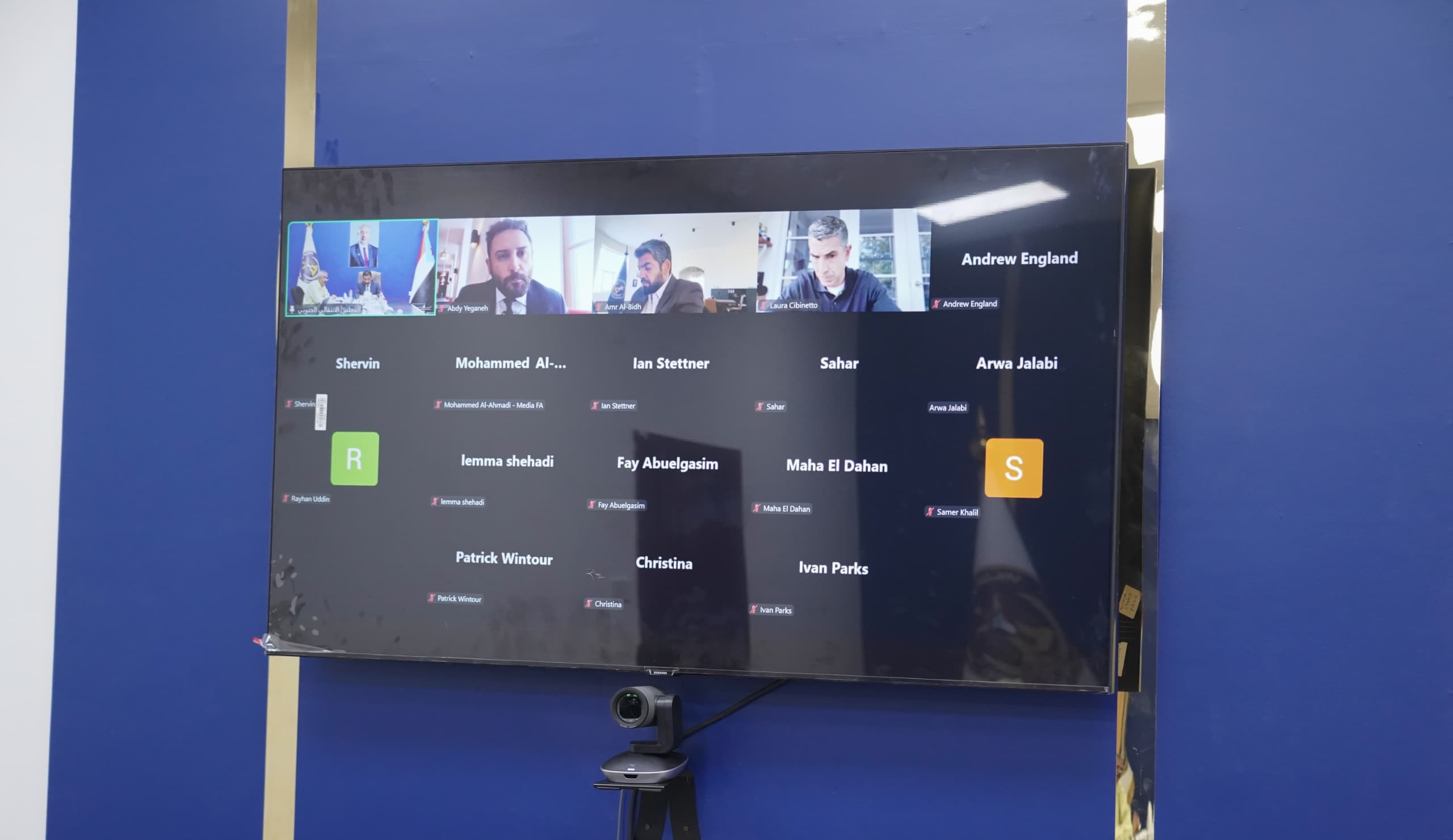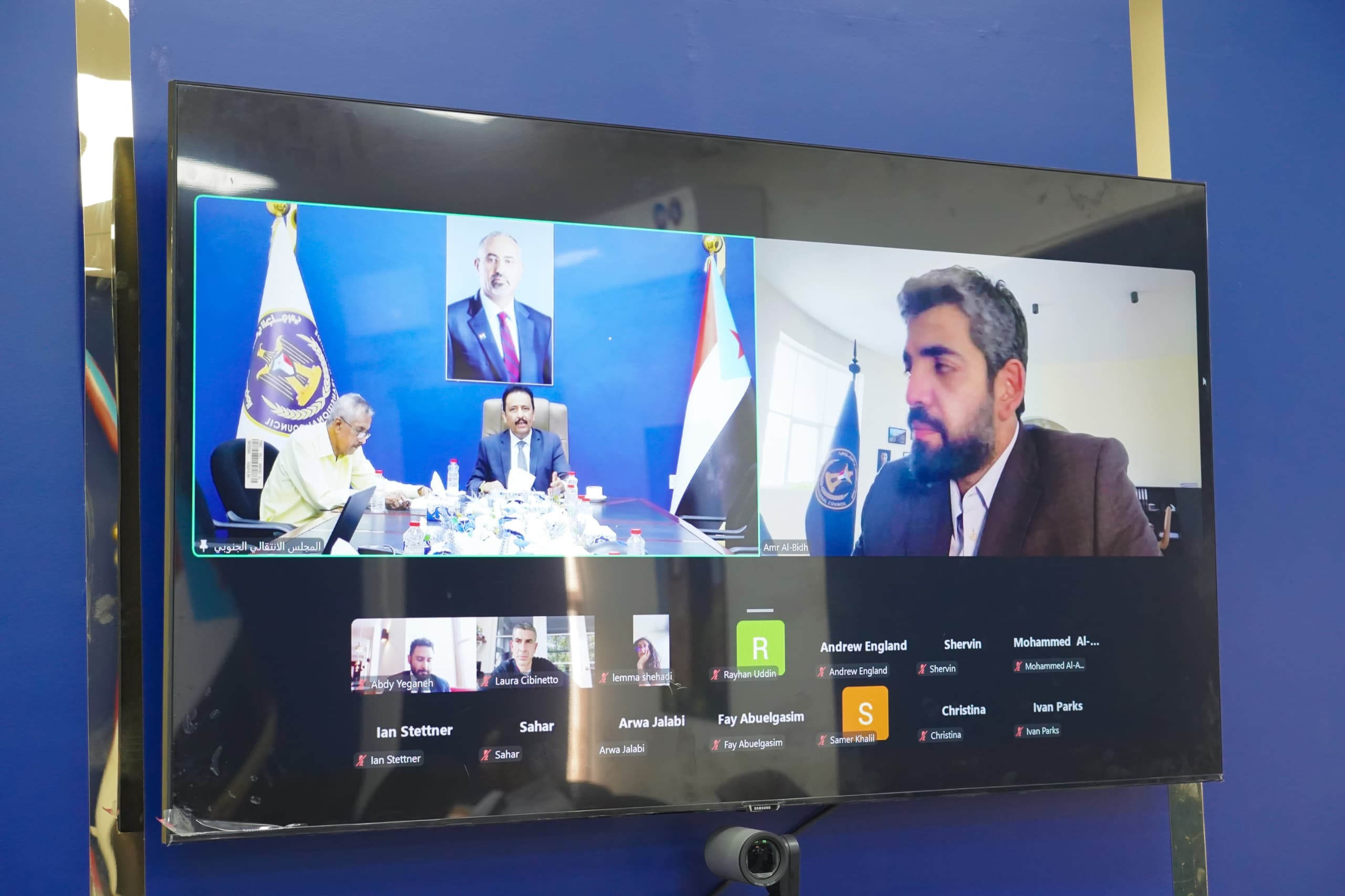Al-Muharrami Stresses Key Role of Private Sector in Stabilizing Currency and Growing Economy
Mr. Abdulrahman Al-Muharrami, Deputy President of the Southern Transitional Council (STC) and member...
Mr. Anwar Al-Tamimi, official spokesperson of the Southern Transitional Council (STC), delivered on Thursday a comprehensive briefing to a number of international media outlets via video conference. The briefing was attended by Mr. Amr Al-Baid, member of the STC Presidium and Special Representative of the President for Foreign Affairs, and Dr. Jaafar Mune'am, Head of the Economic and Service Authority in the General Secretariat of the Presidency.
At the beginning of the virtual briefing, the official spokesperson reiterated that the STC is redoubling its tirelss efforts to overcome the severe economic challenges in the country, noting that the Council "cannot stand idly by in the face of people's suffering."
The spokesperson explained that the basis of the Transitional Council’s relationship with successive governments hinges on their ability to resolve the economic file, pointing out that the current government has shown seriousness in this regard, and that the STC has provided it with political and security support—a move that has yielded some positive developments, such as the improvement in the value of the local currency and early signs of economic recovery. He asserted that these achievements would not have been possible without the cover and support of the Transitional Council.
Al-Tamimi reaffirmed that the STC steadly pursues to achieve major security accomplishments that are not limited to the South alone but also contribute to enhancing regional and international stability, given the strategic geographical location of the South overlooking the Bab el-Mandeb Strait and global trade routes.
The official spokesperson revealed that Southern forces continue to confront terrorism and the Houthi militia and have been making immense sacrifices in doing so, with seven fighters martyred last week. Meanwhile, the forces successfully cleared several areas in Abyan and Shabwa of Al-Qaeda hideouts. He added that this battle is part of the international effort to combat terrorism, noting growing evidence of coordination between the Houthis and terrorist organizations such as ISIS and Al-Qaeda, including the supply of Iranian-made drones.
The spokesperson also emphasized that the stability provided by the Transitional Council has made the governorates of the South a destination for approximately five million displaced people from the North Yemen, who have found a better life compared to areas under Houthi control. Meanwhile, no reverse displacement or migration waves have been recorded.
In a related context, Dr. Jaafar Mune'am provided a briefing on the economic situation, noting that nearly 70% of the public budget revenues came from oil exports. With the halt in exports from Shabwa and Hadramaut due to terrorist attacks by the Houthis, the budget collapsed and inflation rates soared, driving the exchange rate of the US dollar to 2,250 riyals. He indicated that the Central Bank’s intervention with a set of administrative reforms helped bring the rate down to 1,600 riyals, though these reforms remain fragile and unsustainable.
Dr. Mune'am explained that the Transitional Council is pushing for the adoption of a public budget—something that has not been done regularly since 2017—in addition to combating financial and administrative corruption and improving basic services, especially electricity.
He acknowledged that the STC, with support from the United Arab Emirates, launched a 53-megawatt solar power project in Shabwa and laid the foundation for expanding the solar energy project in the capital, Aden, with an additional 120 megawatts to provide sustainable energy at the lowest cost, reducing dependence on traditional fuel.
Mune'am also stressed the importance of resuming oil and gas exports and the need for international pressure in this direction, in addition to restructuring the government and granting competencies of the South a greater space to manage the affairs of the governorates of the South.
In response to journalists' questions, the Transitional Council commented on the recent decrees of President Aidarous Qassem Al-Zubaidi, affirming that these decrees were made to support the government and strengthen the existing partnership. The newly appointed figures, it stated, will assist the government, emphasizing that the Council does not seek to dissolve this power-sharing but rather to cement it in the interest of the citizens.
Regarding the peace process, the STC clarified that designating the Houthi militia as a terrorist organization makes it impossible to negotiate a settlement with them or move forward with implementing the roadmap. It reaffirmed that Southern forces remain decisively engaged in an ongoing war with the Houthi militia on different fronts.
The STC indicated that the situation in so-called Yemen is now divided into two realities: one of stability represented by the South, which is reconciled with its people and its regional and international surroundings; and another in the North, where the Houthis have turned areas under their control into a platform for launching missiles and drones, threatening the region and the world, and carrying out Iranian projects.
The Transitional Council reiterated its call for international organizations to relocate their headquarters to the capital, Aden, where a safer, freer, and more appropriate environment is available compared to Sana’a.
The STC highlighted that Southern forces are contributing to thwarting the smuggling of weapons, drones, and narcotics and are disrupting supply chains, and warned that smuggling is being carried out through terrorist groups in Somalia that Iran and the Houthis have revived to serve their agendas.

